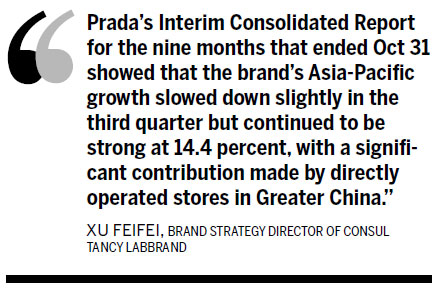Foreign retailers learning how to click with Chinese fashionistas
By He Wei in Shanghai (China Daily) Updated: 2014-02-05 07:52Parallel channels
According to consultancy Bain & Co, more than 50 express firms offer shipping to China, boosting the increase of "Daigou", or parallel channels for overseas shopping.
Almost 60 percent of consumers have made at least some luxury purchases through parallel channels via either Taobao or other buyer agencies and websites rather than from original brands or department stores.
When shoppers buy on a foreign website, they can fill in a local address offered by the courier and transfer the products back to China.
The courier makes a tidy profit on shipping fees and commissions.
Two differing rationales are behind the Daigou spree, according to Xu Feifei, brand strategy director of consultancy LabBrand.
"For luxury products, one major driving force is product prices; Daigou prices are usually cheaper than those in China. For products such as cosmetics, skin care, medicine or baby-related goods, consumers sometimes are willing to pay more money for Daigou, as they are looking for reliability and reassurance," Xu said.
Chinese shoppers constitute 29 percent of the world's luxury spending, according to the latest China Luxury Market Study by Bain.
But sales within China accounted for just 7 percent, indicating that most of such purchases are taking place overseas.
For luxury brands, there are two channels that attract very different types of consumers.
Online and overseas retailers generally lure middle-class shoppers, especially those in first- and second-tier cities, who care about value for money and about quality.
Luxury brick-and-mortar stores, meanwhile, tend to be designed more for the very wealthy or for gift-givers seeking social status.
Although sales in these stores have experienced a slight slowdown from previous years, they are still growing, Xu noted.
"For example, Prada's Interim Consolidated Report for the nine months that ended Oct 31 showed that the brand's Asia-Pacific growth slowed down slightly in the third quarter but continued to be strong at 14.4 percent, with a significant contribution made by directly operated stores in Greater China," she said.
During the weeklong National Holiday, Chinese shoppers spent an average of $12,800 in London, more than the former record-holders from oil-rich Middle East countries, according to the Daily Mail.

Stories of conspicuous consumption by Chinese visitors also abound in Rome, Milan and other European locales, including Liechtenstein, a tiny principality between Austria and Switzerland that is a member of the European Free Trade Association.
South Korea also has risen to become a hot spot for Chinese outbound spending, thanks to its geographical proximity and latest fashion lineups, according to the United Nations Tourism Organization.
The overriding image of Chinese tourists on Jeju island in South Korea is one of busloads of shoppers heading for the luxury boutiques in the Shilla duty-free shop, said Quan Yuefang, a tour guide with Nanjing-based Tuniu.com, an online travel agency.
"South Korea is becoming a new shopping darling for Chinese, notably those from eastern China who are tired of trips to Hong Kong or Southeast Asia," said Quan, who has led trips to the country for five years.
A growing number of approved destination status agreements, a strong yuan and a speedier visa process - even a visa-free policy, in the case of Jeju - are luring price-savvy middle-class earners, Quan said.
To gain traction, traditional sales channels for luxury brands should build a personalized experience and emotional connection with Chinese customers, Xu said
"Chinese consumers are continuing to be strong luxury goods purchasers, whether buying online through Daigou or visiting shops.
"But these consumers are becoming more sophisticated and going beyond simply showing off logos. They seek brands that demonstrate an understanding of and a respect for their needs, especially the brick-and-mortar stores," she noted.
- NHTSA says finds no 'defect trend' in Tesla Model S sedans
- WTO rare earth ruling is unfair
- Amway says 2014 China sales may grow 8%
- President Xi in Europe: Forging deals, boosting business
- CNOOC releases 2013 sustainability report
- Local production by Chery Jaguar Land Rover this year
- Car lovers test their need for speed in BMW Mission 3
- China stocks close mixed Monday

















